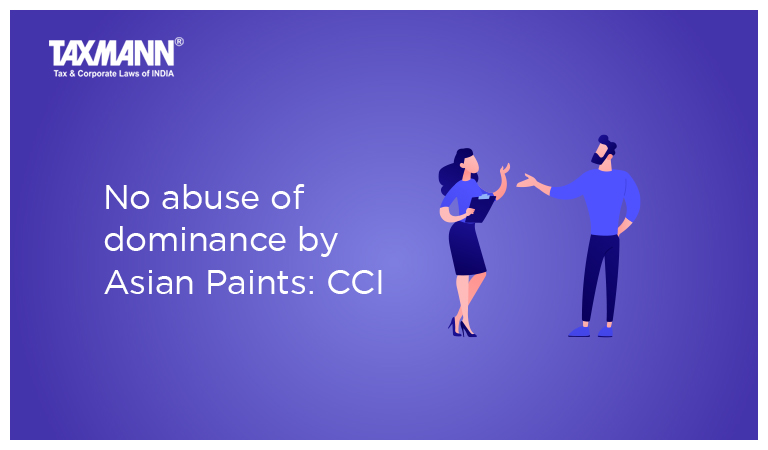No abuse of dominance by Asian Paints: CCI
- Blog|News|Competition Law|
- 2 Min Read
- By Taxmann
- |
- Last Updated on 14 September, 2022

Case Details: JSW Paints (P.) Ltd. v. Asian Paints Ltd. - [2022] 142 taxmann.com 210 (CCI)
Judiciary and Counsel Details
-
- Ashok Kumar Gupta, Chairperson, Sangeeta Verma & Bhagwant Singh Bishnoi, Member
- Gopal Jain, Neeraj Kishan Kaul, Rajshekhar Rao, Sr. Advs. A.S. Sundaresan, Ms Ami Parikh, Sumit Midha, Authorised Representatives
- Vivek Agarwal, Ms Aayushi Sharma, Divyansh Prasad, Vaibhav Gaggar, Sumit Garg, Nipun Bansal, Ketan Sarraf, Akash Chatterjee, Ms Kokila Kumar, Harman Singh Sandhu & Ms Nikita Dwivedi, Advs. for the Appearing Parties.
Facts of the Case
In the instant case, the information was filed by JSW Paints (P.) Ltd (the “Informant) u/s 19(1)(a) against Asian Paints Limited alleging the contravention of sections 3(4) and 4 of the Competition Act, 2002.
JSW Paints alleged that, immediately after the launch of its decorative paints, Asian Paints targeted dealers/distributors/retailers partnering with JSW Paints. It directed them to stop dealing with JSW Paints and threatened them to stop supplies to these dealers.
Further, it also asked dealers to remove display of JSW Paints products from their retail shelves and threatened of not to allow them discretionary discounts, among others.
Further, Asian Paints was alleged to hinder the entry of JSW Paints by virtue of its dominance in the market for the manufacture and sale of decorative paints by the organised sector in India, in contravention of provisions of Section 4(2)(c) of the Act. Thus, the conduct of Asian Paints was aimed at preventing JSW Paints from establishing its presence in the said market
CCI Held
The CCI noted that the conduct of Asian Paints was a case of enforcing an exclusive supply agreement and refusal to deal as provided in Section 3(4) of the Act. Thus, the said conduct caused an appreciable adverse effect on competition by creating barriers to entry, driving existing competitors out of the market and foreclosure of competition by hindering the entry of JSW Paints into the market.
The CCI observed that the Asian Paints prima facie appeared to enjoy a dominant position in the relevant market for “manufacture and sale of decorative paints by the organised sector in India”.
Further, with respect to the alleged contravention of Section 3(4) of the Act, the CCI observed that the restraints imposed by Asian Paints appeared to be in the nature of an exclusive supply agreement and refusal to deal. Accordingly, the CCI directed the DG to cause an investigation to be made into the matter under the provisions of Section 26(1) of the Act.
The CCI, on the basis of DG findings, held that there has to be evidence that, on the balance of probabilities, would point towards a strong entrenched player using tactics to oust a smaller player or even a new entrant to the market (regardless of its size or inherent advantages) by either incentivizing or coercing downstream players to boycott or not deal with the new players.
“In the present case, the balance was not tilted towards JSW Paints. Asian Paints was able to demonstrate that some of its conduct or practices adopted qua the dealers were in furtherance of its terms of doing business with such dealers and not to keep JSW Paints away from the market. “
In view of the above, the allegations of enforcing an exclusive supply agreement and refusal to deal against the Asian Paints were to be dismissed.
Disclaimer: The content/information published on the website is only for general information of the user and shall not be construed as legal advice. While the Taxmann has exercised reasonable efforts to ensure the veracity of information/content published, Taxmann shall be under no liability in any manner whatsoever for incorrect information, if any.

Taxmann Publications has a dedicated in-house Research & Editorial Team. This team consists of a team of Chartered Accountants, Company Secretaries, and Lawyers. This team works under the guidance and supervision of editor-in-chief Mr Rakesh Bhargava.
The Research and Editorial Team is responsible for developing reliable and accurate content for the readers. The team follows the six-sigma approach to achieve the benchmark of zero error in its publications and research platforms. The team ensures that the following publication guidelines are thoroughly followed while developing the content:
- The statutory material is obtained only from the authorized and reliable sources
- All the latest developments in the judicial and legislative fields are covered
- Prepare the analytical write-ups on current, controversial, and important issues to help the readers to understand the concept and its implications
- Every content published by Taxmann is complete, accurate and lucid
- All evidence-based statements are supported with proper reference to Section, Circular No., Notification No. or citations
- The golden rules of grammar, style and consistency are thoroughly followed
- Font and size that’s easy to read and remain consistent across all imprint and digital publications are applied



 CA | CS | CMA
CA | CS | CMA
